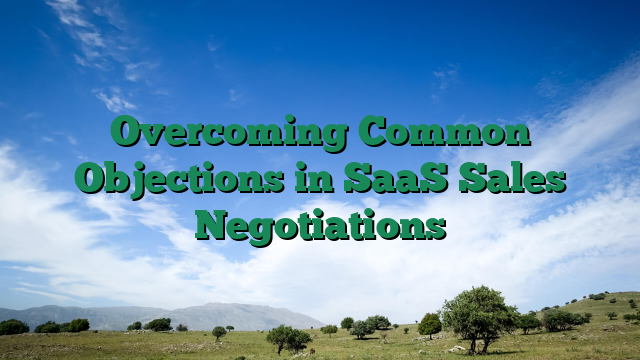Overcoming Common Objections in SaaS Sales Negotiations
SaaS sales can feel like navigating a minefield. One wrong step, and the deal explodes. I remember my first SaaS sales pitch—I was confident, prepared, and ready to close. But then, the client hit me with, “Your pricing is too high.” I froze. That moment taught me the importance of mastering sales objections and turning them into opportunities.
In this post, we’ll dive into the most common SaaS negotiations hurdles—budget, security, and scalability—and share actionable strategies to handle them like a pro. By the end, you’ll not only close more deals but also discover how to monetize these skills for a lucrative side hustle. Let’s get started!
Why Objection Handling is the Key to SaaS Sales Success
In SaaS, objections aren’t roadblocks—they’re opportunities. Every “no” is a chance to educate, build trust, and showcase value. But to do this effectively, you need a game plan.
Here’s the truth: clients aren’t rejecting your product. They’re expressing concerns that, when addressed, can lead to a stronger partnership. Let’s break down the top objections and how to handle them.
1. Budget Concerns: “Your Pricing is Too High”
Budget objections are the most common in SaaS negotiations. Clients often compare your pricing to competitors or question the ROI. Here’s how to respond:
Step 1: Acknowledge Their Concern
Start by validating their perspective. Say something like, “I completely understand. Budget is a critical factor for any business.”
Step 2: Reframe the Conversation
Shift the focus from cost to value. For example:
– “While our pricing may seem higher upfront, our platform saves you 10+ hours per week, which translates to $X in saved labor costs.”
– “Think of this as an investment, not an expense. Our tool increases your team’s productivity by 30%.”
Step 3: Offer Flexible Solutions
If budget remains a sticking point, propose alternatives:
– Tiered pricing plans.
– A free trial or demo to showcase ROI.
– Payment plans or discounts for annual commitments.
Pro Tip: Use case studies or testimonials to back up your claims. For example, “One of our clients increased their revenue by 25% within three months of using our platform.”
2. Security Concerns: “Is Your Platform Secure?”
In SaaS, security is non-negotiable. Clients need assurance that their data is safe. Here’s how to address this objection:
Step 1: Highlight Your Security Measures
Be specific about your protocols:
– “We use end-to-end encryption to protect all data.”
– “Our platform is GDPR-compliant and undergoes regular third-party audits.”
Step 2: Share Success Stories
Provide examples of how you’ve safeguarded client data:
– “We’ve worked with Fortune 500 companies, and our security measures have never been breached.”
Step 3: Offer a Security Walkthrough
Invite the client to a demo focused on security features. This builds trust and transparency.
Pro Tip: Reference authoritative sources like to reinforce your credibility.
3. Scalability Concerns: “Will This Grow with Us?”
Clients want to know your SaaS solution can scale with their business. Here’s how to reassure them:
Step 1: Showcase Scalability Features
Highlight features that support growth:
– “Our platform integrates seamlessly with your existing tools, so you can scale without disruption.”
– “We offer customizable plans that grow with your team size and needs.”
Step 2: Share Case Studies
Provide examples of clients who successfully scaled using your platform:
– “One of our clients grew from 10 to 100 employees while using our SaaS solution without any hiccups.”
Step 3: Offer a Roadmap
Present a clear plan for how your platform will evolve to meet their future needs.
Pro Tip: Use visuals like charts or infographics to illustrate scalability benefits.
Monetizing Your SaaS Sales Skills
Now that you’ve mastered objection handling, let’s talk about turning these skills into income. SaaS sales expertise is in high demand, and there are multiple ways to monetize it:
1. Freelance SaaS Consulting
Offer your services as a freelance consultant to startups or small businesses. Help them refine their sales strategies and close more deals.
2. Create a Course or eBook
Package your knowledge into a course or eBook. Platforms like Udemy or Gumroad make it easy to sell digital products.
3. Affiliate Marketing
Promote SaaS tools you believe in and earn commissions for every sale. For example, if you’re skilled at selling project management software, partner with companies like Asana or Trello.
4. Start a SaaS Sales Blog or Podcast
Share your insights and build an audience. Over time, you can monetize through sponsorships, ads, or premium content.
Pro Tip: Check out for affordable, step-by-step training on building an online business. Their courses and community can help you turn your SaaS sales skills into a profitable side hustle.
Conclusion: Turn Objections into Opportunities
Handling sales objections in SaaS negotiations isn’t just about closing deals—it’s about building trust, showcasing value, and creating long-term partnerships. By mastering the strategies above, you’ll not only boost your sales performance but also open doors to new income streams.
Remember, every objection is a chance to learn and grow. Whether you’re looking to excel in your current role or explore side hustle opportunities, the skills you’ve gained today are invaluable.
Ready to take your online business to the next level? Join and access a wealth of resources designed to help you succeed. From side hustle ideas to advanced sales tactics, they’ve got you covered.
You’ve got this—let’s make it happen!
🚀 Want to level up your online business? Join TheBizWizAcademy and start Networking and Learning!
